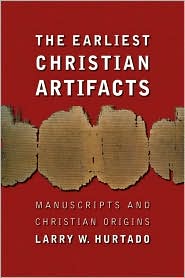Well, then you're just
I must say the title in itself is interesting, however, a tad misleading. In my opinion, it would be wrong to imply that some sort of sectarianism or diversity precludes the concept of "one Church" as, say, a Protestant would understand the term. As he makes the case, there was diversity in earliest Christianity. But does diversity preclude the existence of a clear orthodoxy? I maintain no - and this is a point that Dunn leaves hanging for far too long in a work intended for such an audience.
In my own life, I wouldn't agree with some what my fellow Christians believe - however, these are all too the periphery. As a Christian who loves the early (in some cases pre-scriptural) creeds, I believe such a form is sufficient to maintain orthodoxy. (I can probably say this with more confidence than those with a theological background :))
So, after all the gloom of telling us that Paul was not the only guy in the early church and that there were people opposing him in expression of the faith, we finally get a touching moment on early Christian unity:
What united the first Christians more than anything else was their belief in Jesus - in Jesus as the climax of God's ongoing purpose for man's redemption, the one whom God had raised from the dead and exalted as Lord, the man who demonstrated most clearly what God is like. Clustered round this central distinguishing belief of the first Christians were a number of others on which they would all have agreed in essence, even if their outworking in fuller formulation and practical application diverged in differing degrees: God, the Creator and the Father of Jesus Christ, as one; salvation through faith in Christ; the experience of the Spirit; the Old Testament as scripture and the traditions of Jesus, both to be treasured as authoritative for faith and life; Christianity's continuity with Israel, the people of God; practice of baptism in the name of Jesus and of the Lord's Supper in remembrance of him; and the need for an ethical outworking of faith through love. Such is the heartland of Christianity still. (James D.G. Dunn, The Evidence for Jesus p.99)
But before ending I must add that I really believe that Dunn's image of first century diversity is clouded by his approach to early Christology. Dunn's view which rips the divine Christology from Paul and his favour for developing Christology within the 'Hellenist' Churches forces him to over emphasise some differences between those zealous for the law vs Paul. For example, on the later Jewish Christian sects (such as the Ebionites) he states:
For the Jewish Christians of the second and third centuries, Jesus was simply a prophet, James the first sole leader of the Jerusalem church was the great hero, and Paul who had transformed the faith by opening the door so wide to the gentiles was a renegade and apostate.(p.96)However, can Dunn really argue this? I greatly disagree with Dunn's Christological approach and I see no convincing evidence that the Jerusalem church saw Jesus as anything less than exalted as part of the divine identity of YHWH.
As Larry Hurtado has shown in his extensive works on early Christology, "Devotion to Jesus appeared too early, and originated among circles of the early Jesus movement that were comprised of - or certainly dominated by - Jews...." (Lord Jesus Christ, p. 42). Furthermore, Jesus' divine identity was classifed in terms of first century Judaism in such an exalted manner. As Richard Bauckham states, “the highest possible Christology – the inclusion of Jesus in the unique divine identity – was central to the faith of the early church even before any of the New Testament writings were written, since it occurs in all of them.” ("God Crucified" in Jesus and the God of Israel p.19)
So, in essence, read Dunn on early Christian diversity with his Christological view in mind.




